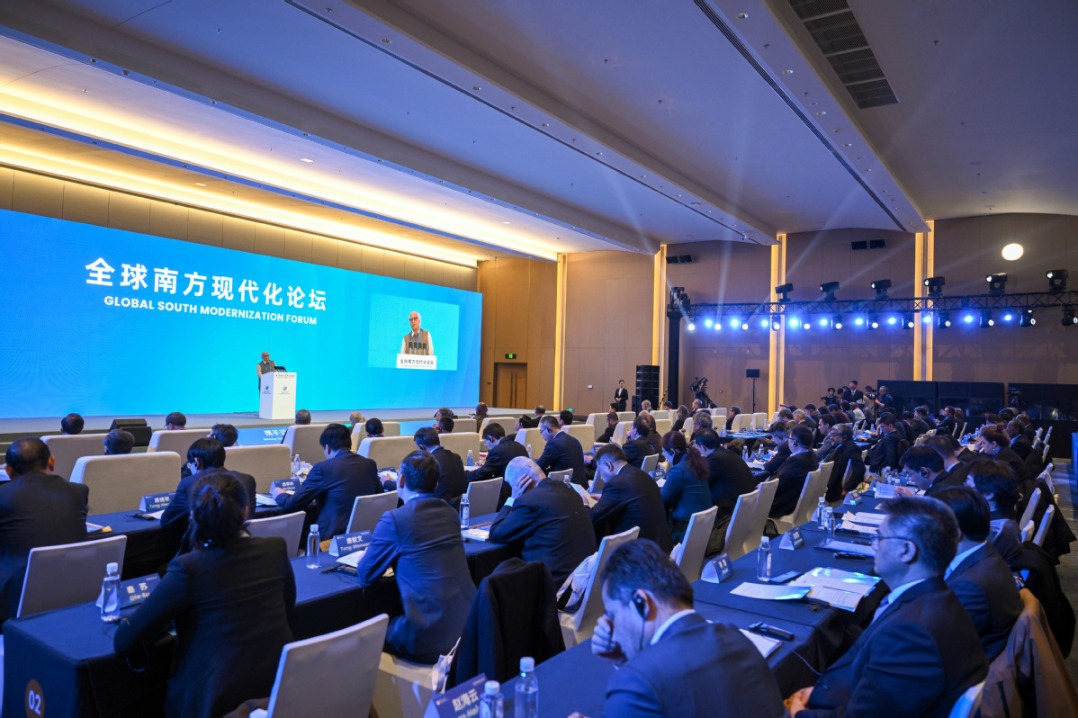Find the right balance
Relations between China and the US in the Middle East are entering a new stage


Relations between China and the US in the Middle East are entering a new stage
The competition between China and the United States in the Middle East made global headlines during President Xi Jinping's visit to Saudi Arabia from Dec 7 to Dec 10. During his visit to the Middle East in July, US President Joe Biden underscored that Washington "will not walk away and leave a vacuum to be filled by China, Russia or Iran". It may sound sensational if we call this a great game, but it has become a really pressing issue how the US and China get along in the Middle East.
At present, the US regards China as its biggest strategic rival, and the situation of all-round and global competition between the two nations has become increasingly real. The US National Security Strategy this year proclaimed that "the post-Cold War era is definitively over and a competition is underway between the major powers to shape what comes next". The escalation of strategic competition with China has become a theme of the times.
The "Indo-Pacific" is seen by the US as the primary location for the strategic competition with China, but all regions of the world could be involved, even though the degree and method of involvement could be different. By comparison, the Middle East is less affected and is not actively involved. From a geographical perspective, the US relies on Europe and its core allies in the "Indo-Pacific" region, and the Middle East belongs to the periphery. From a functional point of view, the Middle East is not part of the US-led alliances for green development, democracy or technology cooperation, nor is it part of its alliance network in the Asia-Pacific or Europe. It is in a marginal position in the US system for containing China.
Compared with the increasingly tense global strategic environment, the situation of China-US relations in the Middle East is relatively relaxed. In regional affairs, there is no obvious conflict between the two sides. China and the US share similar interests in the Middle East, with few conflicts or relatively less remarkable differences. The two sides share common ground in areas such as energy security, anti-terrorism, preventing the proliferation of weapons of mass destruction, and promoting the Palestinian-Israeli talks. With the US withdrawing from its Middle East strategy and China maintaining a level of neutrality and detachment in its Middle East policy, there is little pressure on Middle East countries to choose sides.
The US enjoys a security edge in the Middle East, and China has an economic advantage. The two sides are not very motivated to weaken or replace each other's advantages, and lack the willingness for competition across the board. The influence of China and the US in the Middle East is different in nature, and it is impossible for one to replace the other. The price of challenging each other is too costly.
However, what is worrying is that, with the increasingly frequent exchanges between China and the Middle East in the fields of finance, investment, technology, arms sales, politics, and security, and exchanges upscaled from the lower end to higher end of industrial chains, ties between Beijing and Washington in the Middle East have shifted from being complementary to homogeneous competition. Tensions and contradictions have become inevitable.
In the fields of technical standards, market access, and industrial ecology, the US' competition with China, which is exclusive in nature, has intensified, mixed with multiple factors such as economic interests, political suspicion, and security dilemmas. This competition is increasingly moving in the direction of a zero-sum game. A senior US official said bluntly that for many years, the US and the Middle East have formed a large system or ecosystem consisting of infrastructure, weapons and equipment, high-tech products, and technologies for both military and civilian applications. Now the US is worried that China wants to break this system, and that the nation will undermine its security. It is even more worried about the possibility of China replacing the US system.
In the field of ideology or soft power, should the US or China gain influence, it might come at the expense of the other. Although few people believe that undermining the US is the goal of China's Middle East policy, most people believe that China's words and deeds are objectively eroding the influence of the US.
In the field of diplomacy, China and the US have a head-on collision in their basic principles, leading to divergences on certain regional hot issues. Unlike Washington, Beijing is not directly involved in the hot issues. However, China is an emerging power that is stepping into the center of the Middle East political stage, and it sticks to its principles on every important issue. China does not directly challenge the US, but it provides an alternative to the US' development model and interventionist policies.
The US has long seen the military field as its exclusive domain. Once the competition between the two sides is extended to this field, the conflict could be very acute. The US has already recognized China's leading position in the fields of trade and energy, and may recognize China's dominant position in the field of investment in the future. But it cannot give up its military edge, it is highly vigilant against this. It can even be understood that this is a "redline "drawn by Washington. In the field of strategic security, both China and the US are worried that the Middle East will become a card in each other's hands, which may lead to a typical security dilemma. As an established power, the US tends to have excessive anxiety and sense of urgency, and is prone to exaggerating the strength and intentions of rising countries. The Middle East, as a third party, is worried about the withdrawal of the US from the region. It is eager to use China as a counterbalance.
The confrontation between China and the US at the global strategic level is becoming more and more obvious. At the regional level, the two sides share compatible interests, see broad space in strategies and less likelihood of conflicting interests. At the bilateral level, there are structural contradictions and the security dilemma is obvious. The relations between China and the US in the Middle East will inevitably enter a new stage.
Looking back at history, China and the US had a hostile relationship in the Middle East from 1949 to 1970, a sporadically cooperative relationship from 1970 to 1990, and a parallel relationship from 1990 to 2018. In the era of parallel relations, China's fundamental position was neither cooperative, supportive, or confrontational toward the US. Now China-US relations in the Middle East are at a crossroad.
For China, competition with the US at the global level is not in its interests, nor is a confrontation with the US in the Middle East. That is because the overall strength of the US in the Middle East is more prominent. As far as the US is concerned, it is impossible for Washington to formulate a comprehensive Middle East strategy against Beijing without seeing a significant real threat. So far, the US' containment, response, and complaints against China in the Middle East are partial, sporadic, and emotional, and have not yet constituted a systematic competitive strategy. The US Middle East strategy in the past 10 years has centered on withdrawal, and its containment policy toward China in the region is only some noises.
Looking forward, neither China nor the US will take the initiative to substantially adjust their current Middle East policies without the stimulus of a major emergency. However, they will make careful adjustments in their bilateral interactions. If the two nations can seize the opportunity and make the right choice, they will be able to avoid getting involved in a conflict-ridden crisis management mode in the Middle East. If the two nations miss this window of opportunity, they could fall into full-scale competition in the Middle East. At present, with the strategic competition between Beijing and Washington unfolding in the "Indo-Pacific" and Europe, the future of the Middle East may hold lessons for Latin America and Africa.
The author is head of the Institute of Middle East Studies at the China Institutes of Contemporary International Relations. The author contributed this article to China Watch, a think tank powered by China Daily.
The views do not necessarily reflect those of China Daily.
Contact the editor at editor@chinawatch.cn.


































